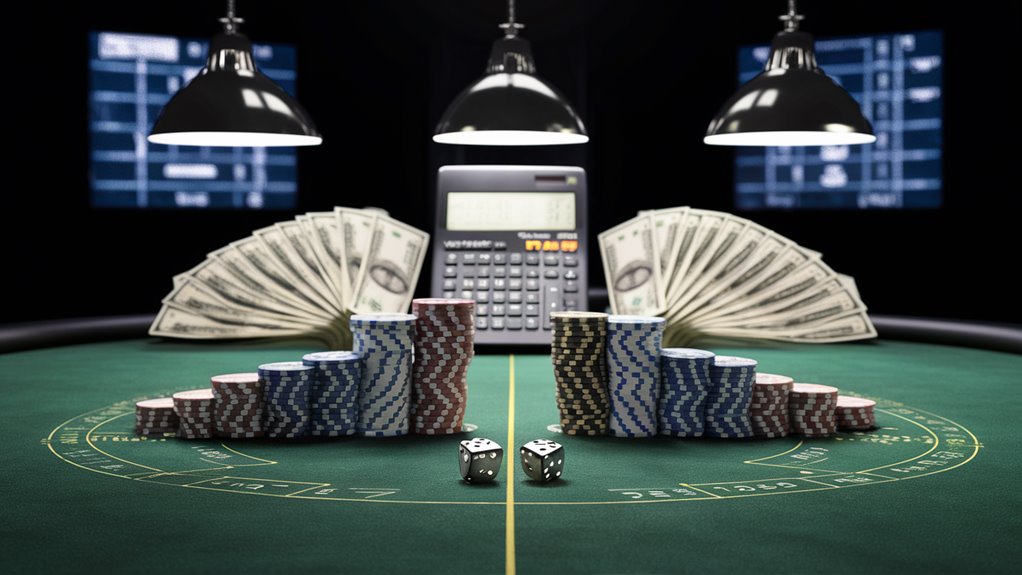Tested Poker Ways That Work Well

Position skill is key to good poker play. Early position needs you to play tight with only the best hands, while late position lets you play up to 70% more hands for more chances to win.
Basic Strategy Parts
Money handling is big for making money in poker over time. Always have 20 buy-ins ready for cash games and keep track of your play to know your game well. This plan helps deal with ups and downs while keeping profits going. 공식 검증 방법 보기
Smart Moves and Signs
Studying others helps a lot. Look at how they bet and how fast they act, to get what hand they have about 65% of the time. Learn the Rule of 4 and 2 to work out odds fast, helping you make smart moves quickly.
Guide on Position
- Early Position: Top pairs (10-10+), good suited connectors
- Middle Position: Good to okay pairs, suited Ax cards
- Late Position: More hands like suited connectors, small pairs
- Button/Cutoff: High attack with 70% more hands to choose
Pro players use these main ways to keep winning at all game levels. They stay strict, keep learning, and use these key ideas well.
Playing Your Position
Being the Best at Position Play in Poker: The Top Guide
Breaking Down Poker Positions: A Full Look
Playing positions are big for great strategy, with three key spots giving you an edge: early, middle, and late positions.
Early Position Plan
Early positions need you to play safe and pick good hands. Here you need the best hands since you’ll act early. Playing with less info means being tight and aggressive with your best starting hands.
Mid Position Moves
In the middle spot, you get more choices but still need to be smart. This lets you play suited connectors and Broadway cards. Seeing how early players act tells you a lot to help make winning moves.
Power of Late Position
Late position (dealer button and one seat before) gives the most ways to win in poker. With full info on others’ moves, you can:
- Go for blind steals
- Play well against weak moves
- Manage the pot size smart
- Play more starting hands
- Put pressure after the flop
Smart Position-Based Moves
Position is more than where you sit – it’s about using what you know to make better moves. Knowing how to use your position lets you:
- Get the most from strong hands
- Keep losses low with okay hands
- Play on other’s weak spots
- Manage the pot size smart
- Bluff better
Handling Your Money
Must-Know Money Management for Poker
Key Money Basics
Managing poker money is a must for playing like a pro. Players should keep at least 20 buy-ins for cash games and 50 for tournaments to deal with ups and downs and avoid big money losses.
Smart Money Rules
Tight money rules build steady play. Risk no more than 5% each game and know your limits. Keep track of wins, losses, and spending to spot weak spots in your game. A State-by-State Breakdown
Keep Money Apart
Smart money handling means keeping poker and personal money separate. Set up a poker-only account and manage it very carefully. For playing different games, split your money smartly based on how risky each game is.
Growing Your Money
Smart level moves start at lower levels where it’s easier. Move up levels as your money and skills grow. Stick to the planned money rules as you go up, to keep doing well in more competitive games.
Money Rules to Know
- Minimum Needed: 20 buy-ins (cash games), 50 buy-ins (tournaments)
- How Much to Risk: No more than 5% each session
- Choosing Levels: Go down if you’re below money limits
- Tracking How You Do: Keep full money records
- Keeping Money Safe: Keep your poker money separate from your living money
Reading Other Players
Learning to Read Poker Tells: A Full Guide

Body Signs in Poker
Body signs are key quiet clues at the table. Players often show unplanned moves with neck tense, how they handle chips, and how they breathe. These signs show up more when it’s tense, making them good info for smart players.
Looking at Betting Ways
Betting ways are usually more telling than body signs in poker. Sudden changes in bets often mean a lot – big bets may hide weak hands, while small bets might mean they have strong hands. Seeing these betting moves gives smart players a big edge in choosing moves.
Smart Sign Spotting
Getting signs right means putting players in groups. While fun players often show more body signs, pro players play more with timing and bet ways. Good sign spotting takes careful watching over many hands to see solid patterns. The best plan uses a mix of signs to really understand other players, helping to read hands and make smart moves.
Getting Pot Odds Right
Getting Pot Odds in Poker Right: The Full Guide
Basic Pot Odds
Calculating pot odds gives you a math edge in choosing moves. Learn to quickly weigh the call cost against the total pot to make winning choices. For example, with a $20 bet into a $100 pot, you get 6-to-1 odds, needing about 14% chance to call well.
Need-to-Know Odds Math
Turning odds to percentages is key for smart choices. Essential changes include:
- 3-to-1 odds = 25% chance needed
- 2-to-1 odds = 33% chance needed
- 4-to-1 odds = 20% chance needed
Smart Odds Moves
Implied odds matter a lot for hands you might draw. A flush draw with nine outs is about 35% likely. Compare this with the real-time pot odds to see if it’s a smart move math-wise. Long-term wins come from making +EV moves based on right odds math.
Fast Math Ways
Quick math tricks help make fast choices while playing. Rounding numbers during play lets you calculate fast while still being right enough. The idea of being “roughly right” rather than “exactly wrong” is very useful when you’re under time stress.
Practice Methods
Get better at odds math with:
- Practice off the table
- Turn common odds to percentages
- Do real-time math drills
- Analyze drawing hand chances
Choosing Hands Smartly
Choosing Poker Hands Smartly
Basics of Winning Hand Choices
Smart hand choices are basic for winning poker. Being strict with starting hands keeps you winning while avoiding tough spots after the flop. The trick is using a position-based hand choice plan that shifts with the game.
What Hands to Play Based on Position
Early Position Plan
Top hands are big in early spots, with:
- Pocket pairs: AA, KK, QQ
- Strong Broadway cards: AK suited/unsuited, AQ suited
- Hands that do well against many players
Mid and Late Positions
Spot advantage lets you play more starting hands:
- Medium pairs (88-JJ)
- Suited connectors (78s-JTs)
- Broadway pairs (KQ, QJ suited)
- Hands with chances after the flop
Adjusting Based on Changes
How Deep Your Stack Is
Stack size matters a lot for what starting hands are best:
- Deep stacks are good for more suited connectors and small pairs
- Short stack play needs strong cards and fast value
Playing Based on Others
Table moves need smart changes:
- With loose players: Play fewer hands but go for the top ones
- With tight players: Play more hands and try more steals
- Use what you know of their game to pick your hands right
Playing in Tournaments
Tournament times change what hands you play:
- Early times: Safe play, focusing on not going out
- Middle times: Use a good mix of hands
- Late times: Play more hands to fight rising blinds



